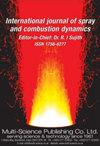脉冲爆震燃烧室高压条件下冲击聚焦起爆
IF 2.1
4区 工程技术
Q3 ENGINEERING, MECHANICAL
International Journal of Spray and Combustion Dynamics
Pub Date : 2020-06-01
DOI:10.1177/1756827720921718
引用次数: 3
摘要
这项工作包括对通过冲击聚焦装置的爆震起始过程与各种初始压力和质量流量之间的相关性的实验研究。脉冲爆震燃烧器在单循环操作中使用化学计量的氢-空气-氧混合物。旋转对称的冲击聚焦几何结构通过聚焦反射的引导冲击波来引发爆震,同时在试验台后端应用挡板来引发升高的初始压力。结果表明,反应性对起爆成功率有重要影响。然而,使用不同堵塞板的测量表明,在预测成功率时,也必须考虑质量流量。从结果中可以得出三个主要结论。(1) 平均流速的增加会引起更高的速度波动,从而在加速爆燃前沿产生更强的前导冲击。(2) 初始静压的增加降低了必须超过的临界冲击强度,以确保通过冲击聚焦成功引爆。(3) 由于初始压力与质量流速直接相关,这些相反的趋势可以相互抵消,对于氧化器中40%体积的氧气可以观察到这一点。拍摄了高速图像,证实了由于引导激波的聚焦,爆震是在会聚-发散喷嘴的中心开始的。本文章由计算机程序翻译,如有差异,请以英文原文为准。
Detonation initiation by shock focusing at elevated pressure conditions in a pulse detonation combustor
This work contains experimental investigations on the correlation of the detonation initiation process via a shock-focusing device with various initial pressures and mass flow rates. A pulse detonation combustor is operated with stoichiometric hydrogen--air--oxygen mixtures in single cycle operation. A rotationally symmetric shock-focusing geometry evokes the onset of a detonation by the focusing of the reflected leading shock wave, while a blockage plate at the rear end of the test rig is applied to induce an elevated initial pressure. The results show that the reactivity has a major influence on the success rate of detonation initiation. However, measurements with different blockage plates suggest that the mass flow rate has to be considered as well when predicting the success rate. Three main statements can be drawn from the results. (1) An increase in the mean flow velocity induces higher velocity fluctuations which result in a stronger leading shock ahead of the accelerating deflagration front. (2) An increase in the initial static pressure reduces the critical shock strength that must be exceeded to ensure successful detonation initiation by shock focusing. (3) Since the initial pressure is directly linked to the mass flow rate, these contrary trends can cancel each other out, which could be observed for 40% vol. of oxygen in the oxidizer. High-speed images were taken, which confirm that the detonation is initiated in the center of the converging--diverging nozzle due to focusing of the leading shock.
求助全文
通过发布文献求助,成功后即可免费获取论文全文。
去求助
来源期刊

International Journal of Spray and Combustion Dynamics
THERMODYNAMICS-ENGINEERING, MECHANICAL
CiteScore
2.20
自引率
12.50%
发文量
21
审稿时长
>12 weeks
期刊介绍:
International Journal of Spray and Combustion Dynamics is a peer-reviewed open access journal on fundamental and applied research in combustion and spray dynamics. Fundamental topics include advances in understanding unsteady combustion, combustion instability and noise, flame-acoustic interaction and its active and passive control, duct acoustics...
 求助内容:
求助内容: 应助结果提醒方式:
应助结果提醒方式:


